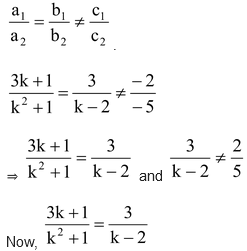
Conditions For Solvability (Or Consistency) Of System Of Equation
Pair Of Linear Equations In Two Variables of Class 10
UNIQUE SOLUTION:
Two lines a 1 + b 1 y + c 1 = 0 and a 2 x + b 0 y + c 2 = 0, if the denominator a 1 b 2 – a 2 b 1 ≠ 0 then the given system of equations has unique solution (i.e. only one solution) and the solutions are said to be consistent.
∴ a 1 b 2 – a 2 b 1 ≠ 0
⇒

Question 1. Find the value of ‘P’ for which the given system of equations has only one solution (i.e. unique solution).
Px – y = 2 ....(i)
6x – 2y = 3 ....(ii)
Solution: a 1 = P, b 1 = –1, c 1 = –2
a 1 = 6 b 2 = –2, c 2 = –3.
Conditions for unique solution is

⇒

∴ P can have all real values except 3.
NO SOLUTION:
Two lines a 1 x + b 1 y + c 1 = 0 and a 2 x + b 2 y + c 2 = 0, if the denominator a 1 b 2 – a 2 b 1 = 0 then the given system of equations has no solution and solutions are said to be consistent.
∴

Question 1. Determine the value of k so that the following linear equations has no solution.
(3x + 1) x + 3y - 2 = 0
(k2 + 1) x + (k - 2) y – 5 = 0.
Sol. Here a 1 = 3k + 1, b 1 = 3 and c 1 = –2
a 2 = k 2 + 1, b 2 = k – 2 and c 2 = –5
For no solution, condition is
 .
.
⇒ (3k + 1) (k – 2) = 3(k 2 + 1)
⇒ 3k 2 – 5k – 2 = 3k 2 + 3
⇒ –5k – 2 = 3
⇒ –5k = 5
⇒ k = –1
Clearly, 3/k - 2 ≠ 2/5 for k = –1.
Hence, the given system of equations will has no solution for k = - 1.
MANY SOLUTION (INFINITE SOLUTIONS):
Two lines a
1
x + b
1
y + c
1
= 0 and a
2
x + b
2
y + c
2
= 0, if
 then system of equations has many solution and solutions are said to be consistent.
then system of equations has many solution and solutions are said to be consistent.
Question 1. Find the value of k for which the system of linear equation
kx + 4y = k – 4
16x + ky = k has infinite solution.
Solution: a 1 = k, b 1 = 4, c 1 = –(k – 4)
a 2 = 16, b 2 = k, c2 = – k.
Here condition is

⇒ k/16 = 4/k = (k - 4)/(k)
⇒ k/16 = 4/k also 4/k = k - 4/k
⇒ k 2 = 64 ⇒ 4k = k 2 – 4k
⇒ k = ± 8 ⇒ k(k – 8) = 0.
k = 0 or k = 8 but k = 0 is not possible otherwise equation will be one variable.
∴ k = 8 is correct value for infinite solution.
Related Topics









